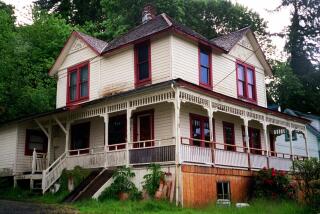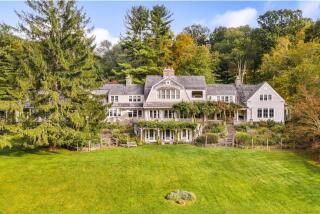A piece of Zane Grey’s West is saved
- Share via
GRANTS PASS, ORE. — After floating the Rogue River’s rapids and falling in love with its steelhead, Western writer Zane Grey bought a mining claim in 1926 at Winkle Bar, where he built a crude one-room cabin of peeled logs and hand-split shingles that became his wilderness retreat.
After Grey’s death, the cabin was acquired by the Haas family of San Francisco, owners of Levi Strauss and at one time the Oakland A’s, who built their own modern cabins on the property but allowed the public to walk around the old Zane Grey cabin as long as they took nothing but pictures.
Now the 32 acres and the buildings on it belong to everyone, bought by the Trust for Public Land from the Haas family and sold to the U.S. Bureau of Land Management, which is nominating it for the National Register of Historic Places.
Meanwhile, it will remain open to the many rafters on the wild section of the Rogue -- Oregon’s most popular white-water river -- who stop by to peer in the windows and marvel that a rich and famous man who was the most popular writer of his day would choose to live in such rustic conditions.
Nelson Mathews, Northwest program director for the Trust for Public Land, said the property’s value was assessed at $840,000. The actual sale price was not disclosed. It includes the original cabin, two modern cabins, outbuildings, one of the boats Zane Grey used to descend the Rogue, a grass airstrip and a garden.
“I think it’s fantastic that they are preserving it,” Eric Grey, the late author’s great-grandson, said from his home in New Jersey. “From the stories I’ve heard, Grey fell in love with that area, but everything was owned by the government. The one way he could have a place of his own was to buy a mining claim.”
The most popular writer of his day, Grey set his novel “Rogue River Feud” in the area. The Rogue River courses through the Klamath Mountains of southeastern Oregon and was among the rivers protected in 1962 by the National Wild and Scenic Rivers Act.
Todd Newport, president of the Zane Grey’s West Society, said from Prescott, Ariz., that Grey’s “love for fishing drove him to those places.”
“He was able to write books as well as movies and magazines, and it was able to pay for his fishing.”
Eric Grey said his great-grandfather was “constantly getting swarmed by people,” who would walk in without knocking at the writer’s Hopi-style home on Catalina Island in California as though it were a public building.
Zane Grey first came to Rogue River country in 1916, “though he had little luck fishing, while his party caught steelhead by the dozens,” his great-grandson wrote in an e-mail. “He returned in 1925 with ambitious plans to run the upper reaches of the Rogue in custom-made boats. The trip down the rapids was dangerous and left Grey badly bruised after his boat grounded. But it’s clear from his writing that he considered the trip worth it.”
The next year, he bought the mining claim as a wilderness retreat, though he was often frustrated fishing there. Others he brought along caught more than he did.
“My great-grandfather said that he spent ‘one of the briefest and happiest days I have ever had’ on the Rogue near Winkle Bar, despite the fact he never got a single bite fishing,” Eric Grey said in his e-mail. “He was in love with the wilderness, and the pristine Rogue was a remnant of what America had been.
“I think he really loved the scenery and the fact that it was very similar to what California looked like 50 years before,” Eric Grey said of the Rogue. “He remarked on several occasions that he was upset that all the rivers in California were dying and all the fish were gone, but Oregon was still essentially intact.”
He said that Zane Grey once wrote, “The quail and trout have vanished from California and the forests are following. I’m glad Romer [Zane Grey’s son] can still see something of wild America, but I fear his son never will.”
“That quote is very personal to me,” said Eric Grey. “He’s talking about my father never seeing this wilderness. We’ve definitely seen more of it disappear. I’m glad there are at least efforts to preserve places like the Rogue. Maybe I’ll have kids someday and it will be there for me.”
More to Read
Sign up for The Wild
We’ll help you find the best places to hike, bike and run, as well as the perfect silent spots for meditation and yoga.
You may occasionally receive promotional content from the Los Angeles Times.






